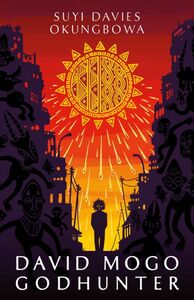Take a photo of a barcode or cover
I think the greatest virtue of this story is how vivid and alive the writing is. Not only in its description of Lagos, but also with the emotions the characters felt, and especially the pain. The author sure knows how to torment David, and the reader at the same time.
Being African, I particularly enjoyed the mythology and magic system portrayed in this book. The one aspect I loved the most was how Kehinde wiels her magic, it was easy to associate it with elements from my own culture, which is predictable since a lot of West African cultures present similarities.
The gods and how they were pictured were also a great element of the story, which is why it was a great surprise to see that the different parts of the novel introduced more of them, even if the first part was my favorite.
The one downside was the fact that there were no glossary of the Nigerian English language, used a lot through the story (especially by Papa Udi, which is the reason I didn't always understand what he was saying), so adding a glossary could've been nice.
Overall this was an awesome read, I wanted a story with authentic African mythology, like the ones I like, and this one didn't disappoint. I strongly recommend !
Future Publication Date: July 9th, 2019
Execution: ⭐⭐⭐
Enjoyment: ⭐⭐⭐
Key Descriptors: Gods, Godpunk, Novellas, Urban Fantasy, African Fantasy, Nigeria, Lagos, OwnVoices
Applicable /r/Fantasy Bingo Squares: Novella (hard mode), Twins (hard mode), #OwnVoices
Premise: The heavens have burst and the gods have fallen. Some are minor pests, mere godlings, but some are high gods with unknown magics and powers. David Mogo, a half-god, contracts himself out to the people of Lagos to help with godling infestations. However, when the local ruling wizard offers him a contract to capture a pair of twin gods, David knows the job is bad news.
Review: This book is quite possibly the epitome of a 3-star book. There were many excellent aspects, but each one was balanced almost perfectly by a negative. While I don't regret reading this book, I'd only recommend it if you're looking specifically for something featuring its positive characteristics and don't mind overlooking a few flaws.
First up, code-switching. For those unfamiliar with this term, I'll direct you to the Wikipedia definition:
In linguistics, code-switching or language alternation occurs when a speaker alternates between two or more languages, or language varieties, in the context of a single conversation. Multilinguals, speakers of more than one language, sometimes use elements of multiple languages when conversing with each other.
I loved the use of code-switching in Godhunter! It was a small bit of subtle social commentary each time David swapped from "proper" US-style English to his family's vernacular. When speaking with the wizard or otherwise conducting business, David consistently used "proper" language so as to be more formal and taken more seriously. At home with his adopted father, we saw David use a more indigenous style language. Unfortunately, although this was very cool to see, it did sometimes obscure meaning a bit. It's a bit tricky to parse "I feel like say pessin carry my body knack am for ground, arrange am back," if it's not a linguistic style you're used to. I'm.... actually still not 100% sure what David was trying to say here, if I'm entirely honest. That said, these instances were not detrimental to the book overall. This is perhaps a more representative example of the vernacular:
"Eh." I kick off my boots. . . "As you be like this, you go fit run ebo* for me this night? I gats work tomorrow.
*ebo is a substance explained in the novel which is harmful to the gods
Next, I thoroughly enjoyed the gods themselves. I would have loved a small slice-of-life style novel wherein David traveled around Lagos helping out folks with godling infestations, a la Mushi-shi (a lovely anime series for those who are unfamiliar). Unfortunately, we only had a slight glimpse of this portion of David's life, as we rapidly jumped into the plot. On the bright side, we still got to meet many interesting high gods and saw quite a bit of how they had impacted Lagos' culture post-fall. The twin god Ibeji turned out to be a much more interesting character than I anticipated, as did their interactions with Fati - I hadn't originally expected either to get as much screen time as they did, but was pleasantly surprised.
Finally, a quick shout out to this being an #OwnVoices read. It's always fun to read literature created from other cultural perspectives, and you can certainly feel that coming through both in tone and in the plot structure.
Sadly, there were a few major flaws to this book that balanced out the good and brought it down to a 3-star ranking.
David Mogo, Godhunter, is not actually a novel. It is three novellas hiding in a trenchcoat standing on one another's shoulders pretending to be one cohesive novel. There are three small, obvious plot arcs with significant time jumps between them. Going in without knowing this makes the pacing feel strange and wrong. Things were happening in the first third of the "novel" that made it seem as though we should be approaching the novel's conclusion - which, technically, we were... or at least the first novella's conclusion. This was jarring and unexpected. If you've read the Binti novels by Nnedi Okorafor, imagine reading all of them at once if they'd been branded as one complete, singular novel. It just wouldn't make much sense, as they are clearly each independent novellas. So it was with David Mogo, Godhunter.
Next, due to this novella structure, I felt a bit cheated out of the steady and thorough character development and worldbuilding I had been hoping for. The novellas were short enough that they had to be action-focused, which left little room for large-scale worldbuilding outside of the events surrounding the protagonist. While a main island with presumably more advanced civilization was discussed, we never found out much clear information. Additionally, we scarcely even got to see the village (town? city? I don't even know what the population was!) David was living in. There are some faceless villagers, but we never got to meet anyone who wasn't plot relevant in some way or have any sort of look into people who made up David's culture and daily life.
In addition to these structural issues, there were some glaring issues with the writing itself. Far too often, the reader is exposed to info dump style monologues. It felt less like a slow discovery of the world and more like being spoon fed a few tidbits here and there. Rather than painting a picture for the reader, we were provided a few small photographs that didn't really provide nearly enough context.
In conclusion, if you're hankering for some African fantasy featuring gods and seeing code-switching in a novel, David Mogo, Godhunter is probably a worthwhile read. If those two things don't interest you particularly, you may be better off looking elsewhere for your next book.

David Mogo, Godhunter, can be found on Amazon and Goodreads.
If you liked David Mogo, Godhunter, you might also enjoy:
- Binti by Nnedi Okorafor
- The Black God's Drums by P. Djèlí Clark
- Sister Light, Sister Dark by Jane Yolen
Absolutely beautiful cover art (its shiny!).
this was so much fun! it was action packed, fast paced, and filled with mythology. however, i found myself not emotionally invested in the characters due to the focus of plot and worldbuilding. overall, a solid read and i cannot wait to read more of suyi davies okungbowa's works in the future.
I found it confusing and the plot seems to have some issues.
Not my cup of tea.
Many thanks to the publisher and Netgalley for this ARC, all opinions are mine.
David Mogo, a half God who is also extremely complaining and way too proud person, decides to take up a job that looks impossible.
Now, we all know how the story of demigods goes. Sprinkle a lot of self-righteous speech, with a dash of self-doubt. And then trust the author to kill the rest of the plot. This book is repetitive, monotonous and has a pace slower than a snail.
What started as an extremely promising pot, it soon turned out to be difficult to follow. The whole dramatic approach to all things simple and the Nigerian dialect only made the pace slower, until I wanted to hit my head on a wall.
Things went wrong too soon in this book. or maybe, it just wasn't for me.







